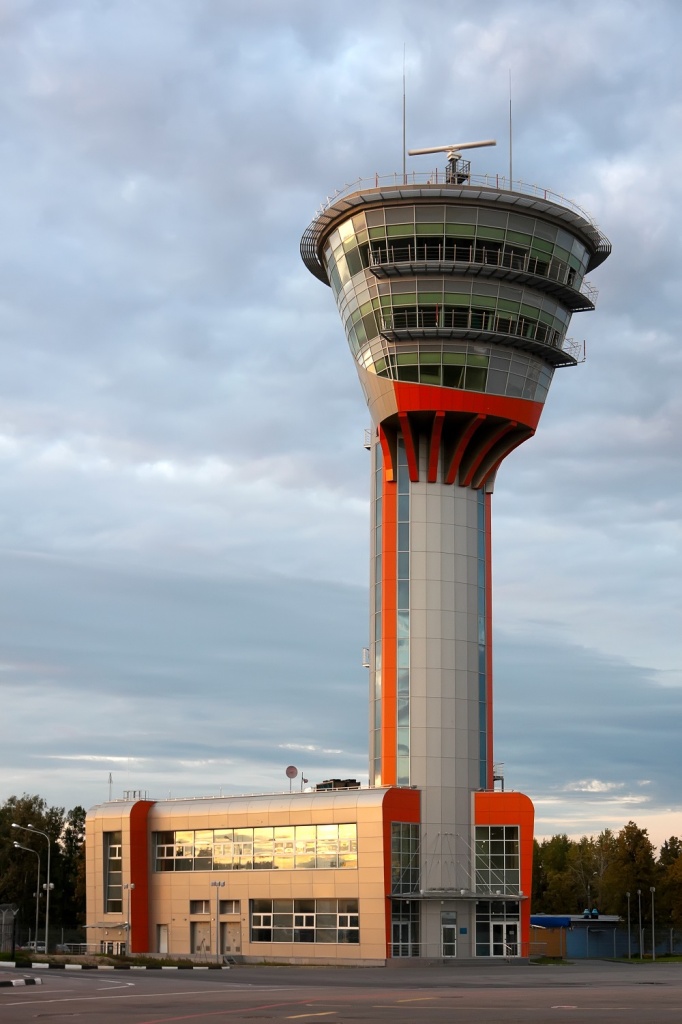Transstroy improving Russia’s aviation infrastructure. World Highways
November 1, 2013
Aviation is playing an important role in developing Russia’s economy and resolving socio-economic issues. It’s particularly important for the country’s role as an international and domestic hub, ensuring the transportation of residents from remote regions
Transstroy-built Sheremetyevo airport control tower
In recent years Russia has carried out large-scale modernization of its aviation capabilities, updating technical equipment, construction and development of airfields and airport infrastructure ahead of its promotion at upcoming international events such as the 2014 Sochi Olympic Games, the football World Cup in 2018, and other regional development projects. An effective national airfield and airport network will allow a high level of air transport security, continuing passenger growth and an expansion of the number of flight paths offered. Furthermore, it will increase availability of year-round flights in modern aircraft to different regions of Russia. Transstroy is among the transport infrastructure construction companies benefiting from the upgrade in Russia’s aviation sector. The firm has a proven track record on aviation-based construction projects. The firm’s projects have included the construction and reconstruction of major Russian airports and air bases, such as Sheremetyevo (Moscow), Vnukovo (Moscow), Pulkovo, Gelendzhik (Krasnodar Territory), and Blagoveshchensk airports, and Khotilovo air base. Of the four control towers, including command and control centres, constructed in Russia in the past four years, three – at Vnukovo, Sheremetyevo, and Gelendzhik airports – were built by Transstroy. The fourth control tower was built at Koltsovo (Novosibirsk) airport.
Transstroy works on solo projects in addition to projects in partnership with Russia’s Research Studies Institute of Transport Construction. The company provides a full range of activities in the field of airfield construction including the construction of runway, aircraft parking, bearing track (taxi strip), central command control centres, drainage systems, roads and industrial and civil sites.
Airfield and airport infrastructure construction projects are, says Transstroy, the hardest construction projects, as the quality of work performed by the contractor is crucial to ensuring safe flights for passengers, and a reliable and delay-free aircraft service.
Currently, Transstroy is building a new runway (Runway 3) at Sheremetyevo Airport. The plans for the project include building around 90 facilities, of which the largest runway will be 3,200m long with a width of 60m. The overhead road taxiway (Taxiway D) is the most important part of the new runway and involves an innovative construction. According to the plans, the taxiway will join Runway 3, with the existing airfield and the overhead road crossing over the Sheremetyevo functional highway. Similar structures to the Taxiway D being built at Sheremetyevo Airport have been built at some of the main international airports in Europe, including in Amsterdam and Paris.
Transstroy is providing solutions to Deal with weak soil foundations, wetlands, old riverbeds and streams at the construction site of Runway 3 at Sheremetyevo Airport. The firm has extensive experience providing solutions to similar issues at other project sites that have difficult geological and climatic conditions. An example of this is the company’s work on the construction of the Kurortny Avenue alternative route to the Sochi Mountains and the Amur- Yakutsk highway, which experiences extremely low temperatures in Yakutia.
According to the Sheremetyevo Airport project, the airfield will be classified as 4-F by the ICAO, which will allow it to accept all modern types of foreign and domestic airplanes. The planned capacity for the new runway will be 44 takeoffs/landings per hour. The integration of Runway 3 will increase the capacity of the Sheremetyevo Airport, allowing passenger service to increase to 65 million people annually by 2030.
Transstroy has also been updating the infrastructure at Krasnodar airport as part of the development of a modern and efficient transport system in South Russia. The project includes the reconstruction of Runway 2, the creation of complex engineering installations, the installation of technology providing delay-free, high-quality servicing of aircraft. The airport in Krasnodar will conform to Class II ICAO category after the completion of the works. It will be able to take the most modern airplanes, allowing Krasnodar airport to become South Russia’s largest regional transport hub.

